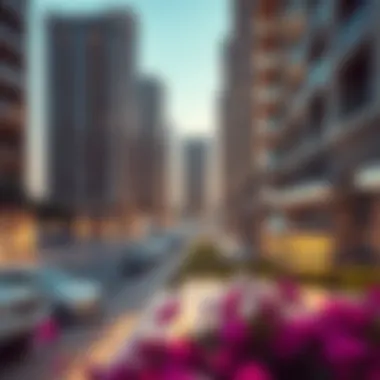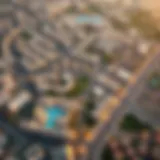Strategic Factors Influencing Dubai Residence Complexes


Intro
Dubai, a city that seems to have emerged from a storyteller's dream, thrives on its eclectic mix of cultures and modern marvels. The skyline, punctuated by architectural wonders like the Burj Khalifa, stands testament to the ambitious spirit of its residents. Yet, behind these glitzy facades lies an intricate web of factors influencing the choice of living spaces for many, exacerbated by the city’s constantly evolving real estate landscape.
When it comes down to selecting a residence complex in Dubai, it’s not just about picking a location that looks fancy or has awesome views. No. It’s about nodding to the practical side of life. Things like access to basic amenities, connectivity to transport hubs, and the potential for future appreciation in property value play a pivotal role. The reality is that proper due diligence can lead to smarter choices, ultimately unlocking the door to a fulfilling life in the Emirate. In this guide, we will delve into key aspects surrounding residence complex locations, highlighting the geographic, economic, and social factors at play.
Stay tuned, as this overview will guide potential home buyers, investors, and expatriates through the bustling neighborhoods of Dubai. Whether you're looking for the next hotspot for investment or just a comfy place to call home, the insights offered here will provide clarity amidst the seeming chaos of options. Let's unpack what makes a location truly desirable and how to navigate this vibrant market.
Understanding the Dubai Real Estate Market
Understanding the dynamics of the Dubai real estate market is critical for anyone looking to explore the opportunities it presents. The rapid growth of this metropolis has transformed it into a hub for diverse investments, making it a focal point for both local and international buyers. With the continuous influx of expatriates and investors, grasping the market's intricacies is essential for making informed choices. This section discusses the key components and benefits of comprehending the real estate landscape in Dubai.
Overview of Market Dynamics
The Dubai real estate market functions as a robust ecosystem influenced by various factors. The market is characterized by its resilient demand for residential properties, particularly in established neighborhoods and emerging areas. In recent years, the government's initiatives to diversify the economy have also played a pivotal role. For instance, events like the World Expo 2020 have catalyzed accelerated infrastructure development, affecting property values and attracting investors.
The demand-supply dynamic is ever-evolving. Prices may ebb and flow due to seasonal interest, economic factors, or changes in foreign regulations. For example, the introduction of long-term visas for expatriates has significantly bolstered buyer confidence. Homebuyers and investors should keep an eye on price trends and the specifics of various neighborhoods to make wise decisions.
Some important factors to consider include:
- Changing demographics of residents
- Interest rates and global economic conditions
- Availability of new developments versus established properties
Role of Foreign Investment
Foreign investment remains a cornerstone of the Dubai real estate landscape. Dubai's ongoing push to position itself as a global business and lifestyle destination has led to increasingly favorable conditions for overseas investors. The legal framework is designed to entice foreign capital, allowing non-UAE nationals to purchase properties in designated areas. This flexibility not only stimulates market growth—encouraging the development of luxury properties and high-rises—but also enriches the local economy.
Potential buyers should also be aware of the tax implications and legal stipulations involved in foreign ownership. The UAE currently imposes no personal income tax or capital gains tax, making it a sweet spot for many investors.
To sum it up, understanding the Dubai real estate market isn't just about knowing where to buy; it’s about grasping the broader economic landscape, the role of foreign investment, and how these elements will affect your potential returns.
"An informed buyer is a successful buyer; knowing the ins and outs of the market enables one to seize opportunities at the right moment."
To further your understanding of Dubai's market, consulting local real estate experts and up-to-date resources can provide invaluable insights. Websites like Dubai Land Department or Khaleej Times can offer reports and analytics that inform about changing trends and other factors impacting real estate.
Geographic Distribution of Residence Complexes
The geographical layout of residence complexes in Dubai serves as a pivotal element in understanding the overall real estate landscape of the city. As urban development continues to accelerate, grasping the nuances of where these complexes are situated can greatly influence potential buyers and investors. Knowing the right location often means the difference between thriving in a bustling community or feeling isolated in a less favorable area.
Benefits and Considerations
Strategically located residential complexes often boast proximity to essential amenities like schools, healthcare facilities, and recreational areas. This not only enhances the living experience but also increases property values over time. Furthermore, being in a neighborhood that fits one’s lifestyle - be it nightlife, family-friendly environments, or serene retreats - can make living in Dubai more enjoyable.
Nonetheless, as appealing as certain areas may seem, factors such as traffic congestion, noise levels, and even the local climate can play significant roles in one's daily life. Therefore, a comprehensive understanding of the geographic distribution allows potential home buyers and investors to weigh these considerations effectively.
Key Neighborhoods in Dubai
Downtown Dubai
Downtown Dubai stands as a shining jewel in the skyline, characterized by magnificent architectures like the Burj Khalifa and the Dubai Mall. This area is often viewed as the pulse of the city, providing an array of luxury living options alongside vibrant dining and entertainment scenes.
The key characteristic that makes Downtown Dubai a prime choice is its central location. Being at the heart of the city means residents are just minutes away from business hubs and cultural attractions.
A unique feature of Downtown is the Dubai Fountain, which adds charm and allure for residents and tourists alike. The advantages of living here include high rental demand and potential capital appreciation, though it tends to come with a hefty price tag which can be a barrier for some.
Dubai Marina
Dubai Marina is renowned for its stunning waterfront views and vibrant lifestyle, drawing in both locals and expatriates. One major aspect that contributes to the area’s appeal is its luxury resort-like ambiance - think picturesque promenades lined with high-end cafes and restaurants.


The key characteristic of Dubai Marina is its proximity to the Arabian Gulf, offering a waterfront lifestyle that appeals to those who enjoy outdoor activities such as sailing and beach outings.
A unique feature here is Marina Walk, where various leisure options abound. Homebuyers may find that while property prices are competitive, the clientele is consistently looking for rental outlets, making it an attractive area for investors. The downside, however, could be crowdedness, especially during peak seasons.
Jumeirah Beach Residence
Jumeirah Beach Residence (JBR) epitomizes beachside living in Dubai. The appeal of this neighborhood lies predominantly in its lifestyle offering; with the beach at residents' doorsteps, it provides an ideal environment for lovers of sun and sand.
What's particularly striking about JBR is the shopping and entertainment options on The Walk, where a mix of global cuisines and local shops create a versatile cultural tapestry. JBR is a popular choice not just for families but also for young professionals seeking a vibrant social scene.
However, living in this sought-after area also comes with challenges, such as higher-than-average property prices and the noise of the bustling beach crowd, which may not suit every preference.
Emerging Areas of Interest
As Dubai continues to grow, emerging areas are capturing the attention of investors and homebuyers alike. Locations like Dubai South and Mohammed Bin Rashid City are beginning to foster a vibrant community feel, often at more attractive prices compared to established neighborhoods. These areas prioritize spacious landscapes and are integrated with modern conveniences, presenting opportunities not just for living but thriving in Dubai's fast-paced environment.
Investing in these emerging locales can lead to favorable returns, as they become more established over time. As always, doing your homework is crucial to nailing those investment opportunities while avoiding potential pitfalls.
Proximity to Amenities
Understanding the importance of proximity to amenities is crucial for anyone looking to invest or inhabit residential complexes in Dubai. This aspect plays a pivotal role in determining both the livability of a location and its attractiveness to potential buyers or renters. Amenities are not just conveniences; they greatly influence the overall quality of life and comfort for residents. Living near schools, hospitals, shopping centers, and entertainment options means minimizing commute times and maximizing leisure opportunities, which are vital considerations for families and professionals alike.
Educational Institutions
When it comes to families, the presence of quality educational institutions nearby can be a significant deal-breaker or maker. Many expatriates, in particular, prioritize access to both local and international schools. Areas like Jumeirah and Downtown Dubai are known for their prestigious schools. Parents often find themselves comparing curriculum options and school rankings, so having reputable schools close to home can ease their worries and impact their final decision on where to settle down.
Moreover, proximity to educational institutions can enhance property values. The better the schools, the more in-demand the area tends to be, leading to steady appreciation in property prices. Here are a few noteworthy institutions:
- Dubai American Academy
- Regent International School
- GEMS Wellington International School
Choosing a residence close to these schools is likely to save families not only time but also money on transportation.
Healthcare Facilities
Similarly, access to healthcare is another non-negotiable factor. Prospective residents want to know that they can easily reach a hospital or clinic in case of emergencies. Having a reputable facility nearby is paramount, especially for families with young children or elderly members. Areas such as Dubai Marina boast a range of healthcare options, including Medcare Hospital and American Hospital Dubai, where quality treatment is guaranteed.
The availability of a multitude of healthcare facilities also contributes to the desirability of a location and can impact property values. For anyone considering buying or renting, here are a few essential healthcare services to look into:
- Pharmacies and clinics
- Emergency services
- Specialized medical centers
These healthcare amenities not only provide peace of mind but are also vital for a thriving community.
Shopping and Entertainment
When an individual decides where to live, shopping and entertainment can sway their choice more than a little bit. Being within reach of shopping centers, movie theatres, and leisure facilities adds an extra layer of comfort to everyday life. Mall of the Emirates and Dubai Mall are among the most famous shopping destinations; both provide not just retail options but also dining and entertainment experiences under one roof.
Additionally, local markets or community stores can offer a more relaxed shopping experience, promoting community engagement. Residents often appreciate the blend of high-end retail with casual shopping where you can find specialty stores or farmers' markets. Here’s a glimpse of some benefits of having shopping and entertainment areas nearby:
- Immediate access to everyday essentials
- Variety of dining options for all tastes
- Entertainment for families and children
Ultimately, living near a vibrant mix of shopping and entertainment options not only enriches one's lifestyle but could serve as a magnet for future resale value too.
"Proximity to amenities is not just about convenience, it’s about cultivating a lifestyle that fosters community connection and personal well-being."
Transportation Infrastructure
Transportation infrastructure plays a pivotal role in shaping the attractiveness and accessibility of residential complexes in Dubai. A well-planned and efficient transport network not only enhances the quality of life for residents but also impacts property values significantly. For potential homebuyers and investors, understanding these dynamics is crucial. This section will dive deeper into two vital components of transportation infrastructure: the public transport network and road connectivity.


Public Transport Network
Dubai's public transport system is a testament to modern urban planning, effectively connecting various neighborhoods and districts throughout the city.
- Metro System: The Dubai Metro runs extensively with both the Red and Green lines covering major residential areas including Downtown Dubai, Dubai Marina, and Jumeirah. The reliability and frequency of trains make it a popular choice among residents. This system reduces reliance on personal vehicles, easing traffic congestion.
- Buses and Trams: The bus services further complement the metro network, reaching places that may not have direct metro access. The newly instituted tram system in areas like Dubai Marina offers another layer of convenience.
The integration of these methods leads to greater connectivity, fostering vibrant communities around transit hubs. For example, the area surrounding the Burj Khalifa station has seen a spike in property interest spurred by its proximity to public transport.
"A robust public transport network enhances the livability of an area, catering to various demographics from young professionals to expatriate families."
Road Connectivity
Dubai's road infrastructure is meticulously designed to handle a high volume of traffic and ensure smooth commutes. Major highways, such as Sheikh Zayed Road, link various neighborhoods, making them easily accessible.
- Major Highways and Routes: Roads are not just wide; they are also lined with amenities and services. The accessibility of key routes can make or break a neighborhood’s desirability. For instance, easy access to the Al Ain Road is attractive for families looking to stay connected while enjoying a suburban lifestyle.
- Traffic Management: The use of advanced traffic management systems in Dubai. Such systems make traveling by car easier and more efficient, reducing travel times. Moreover, initiatives aimed at promoting ride-sharing and carpooling are in place, which reflects a forward-thinking approach to road management.
In summary, both the public transport network and substantial road connectivity are fundamental in enhancing the appeal of residential locations in Dubai. They not only facilitate ease of movement but also encourage investment by ensuring that communities are accessible and convenient for families and individuals alike. This interconnectedness among public systems is a major factor that potential buyers and investors shouldn’t overlook.
Social and Community Factors
When considering the location of residence complexes in Dubai, social and community factors play a crucial role that goes beyond mere investment numbers or geographical perks. A vibrant community can significantly influence the overall living experience and property value. Prospective buyers and investors should clearly understand how these social dynamics interact with real estate and define their long-term satisfaction.
Community Engagement
In Dubai, community engagement is more than a buzzword; it's a concrete element that affects how residents experience their neighborhoods. Many residential complexes offer shared amenities, like parks, pools, and community centers, where families can connect and socialize. This fosters a sense of belonging, which is often a major draw for expatriates seeking an enriching lifestyle away from home.
For example, areas like Dubai Marina not only provide stunning waterfront views but also host community events throughout the year. These may include outdoor movie nights, fitness classes, or festivals celebrating diverse cultures. In neighborhoods such as these, homeowners often report higher levels of satisfaction and community pride. The connections developed through these events can be an essential part of life in Dubai and contribute to the overall quality of life in residence complexes.
Cultural Influences
Cultural influences are another important aspect that shapes the fabric of Dubai's communities. The UAE is a melting pot of nationalities, and this diversity is reflected in many of the neighborhood dynamics. Each district brings its unique flavor, from cuisine to festivals and language. For instance, Jumeirah Beach Residence attracts a mix of international families and tourists, creating an atmosphere that celebrates multiculturalism. Residents often find opportunities to engage in various cultural activities ranging from art exhibitions to culinary experiences.
The integration of culture into community life affects property desirability. Highlighting cultural significance serves as a point of attraction for buyers looking for more than just physical living spaces. A neighborhood that celebrates art through exhibitions or hosts cultural flexes tends to appeal to those desiring a robust lifestyle rather than just a home.
Embracing these cultural elements can also positively impact property values, as unique community characteristics often enhance the overall appeal of a residence complex.
A strong community can elevate property values and enhance living experiences, making it crucial for real estate decisions.
In summary, social and community factors hold significant sway in the selection of residence complexes in Dubai. Community engagement and cultural influences contribute to a holistic living experience that resonates with both residents and investors. Understanding these factors can lead to superior investment choices and enriched lifestyles.
Investment Potential of Locations
When diving into the vibrant world of Dubai's real estate market, understanding the investment potential of various locations becomes paramount. The way property values fluctuate based on neighborhood desirability, infrastructural development, and economic trends can significantly influence both short-term profits and long-term wealth accumulation. This is especially true in a city like Dubai, which has seen rapid transformation and growth over the past two decades.
Property Appreciation Trends
In recent years, certain areas in Dubai have witnessed remarkable property appreciation trends. For instance, neighborhoods like Downtown Dubai and Dubai Marina have consistently ranked high in terms of value increase, fueled by luxury developments and a bustling lifestyle. A property bought three years ago in these areas might fetch 20-30% more today, mainly due to the amalgamation of local and foreign investments.
- Market Drivers: Several factors drive these trends, including governmental initiatives like Dubai Expo 2020, which has laid the groundwork for enhanced infrastructure and tourism. As the city gears up for more global events, residents and investors alike feel a renewed confidence in property investment.
- Global Demand: The appeal of owning property in Dubai goes beyond the local market. It attracts international buyers, particularly those from regions seeking stability and growth in real assets. This global interest propels property values upward, enhancing the ROI for current investors.
- Future Developments: Furthermore, areas earmarked for future developments, such as the Dubai Creek Tower and expansions in the Dubai South district, signify potential hotspots for appreciation. Investors keeping an eye on these developments might find themselves in a profitable position sooner rather than later.
Rental Yield Analysis
Alongside property appreciation, rental yield is a critical metric for anyone considering real estate as an investment avenue in Dubai. The yield represents the annual return on investment calculated by dividing the rental income by the property's value,
- Average Yields: As of late 2023, Dubai’s rental yields generally range from 7% to 10%, depending on the location. This is notably higher than many major global cities like London or New York, making Dubai an attractive proposition for landlords.
- Neighborhood Insights: Properties in Jumeirah Beach Residence typically have higher yields compared to other areas due to their prime beachfront location and proximity to major attractions. Many expatriates look for rental homes in this vicinity, contributing to a steady demand and, consequently, higher rental rates.
- Considerations for Landlords: When analyzing rental yields, landlords should also consider management fees, maintenance costs, and the overall state of the rental market. By factoring these elements into their calculations, investors can gain a clearer picture of their potential earnings versus expenditures.


In summary, the investment potential across various locations - supported by property appreciation trends and favorable rental yields - illustrates why Dubai is a goldmine for real estate investors. It’s essential to stay informed and adaptable, as shifting market dynamics can either present opportunities or challenges.
"Investing in Dubai’s real estate is not just about buying property; it's about securing a slice of a global narrative that keeps evolving with every passing moment."
For additional information, you might explore related resources at Wikipedia, or check financial insights on Investopedia.
Legal Considerations for Foreign Buyers
In Dubai's dynamic real estate market, understanding legal considerations for foreign buyers is of utmost importance. Whether one is looking to invest in a lavish apartment in Dubai Marina or a villa in Jumeirah, being aware of the legal landscape can help avoid pitfalls and ensure a smoother transaction. Foreign investors often find themselves navigating a complex set of rules and regulations that govern property ownership in the emirate.
Understanding Ownership Laws
The laws surrounding property ownership in Dubai are relatively foreigner-friendly compared to many other places. Foreigners are allowed to buy properties in designated areas known as freehold zones, such as Downtown Dubai and Dubai Marina.
However, it’s essential to grasp the specific types of ownership:
- Freehold Title: This grants the buyer complete ownership of the property, including the land it sits on.
- Leasehold Title: This means purchasing the right to use a property for a set term, usually up to 99 years, with the land still owned by an Emirati national or entity.
It’s also worth noting that even in freehold zones, there can be certain stipulations attached, such as restrictions on property types or the need for additional permissions in some cases. Laws can change, so staying updated through reputable resources such as Dubai Land Department is crucial.
Current Regulatory Environment
The regulatory environment for foreign property buyers in Dubai is evolving. Authorities like the Dubai Land Department and Dubai Investment Development Agency are working to create a more transparent and accessible market. Recent reforms include the introduction of the Golden Visa, which grants long-term residency to property owners who meet certain criteria.
Additionally, foreign investors should keep an eye on:
- Registration Requirements: All property transactions must be registered with the Dubai Land Department, a step that protects buyer rights.
- Financing Regulations: For those seeking mortgages, understanding the financing options available to foreigners is critical. Lenders often have differing requirements based on nationality and property type.
- Tax Regulations: While there are no capital gains taxes on property in Dubai, understanding potential fees and charges during the buying process, such as the 4% transfer fee, is vital for budgeting.
"Before taking the plunge, it's prudent to consult with legal experts specializing in Dubai's property laws. Their insights can save you time and money, ensuring you're on the right side of the law."
Navigating the legal landscape may seem daunting but understanding these elements enables foreign buyers to make informed decisions when investing in the vibrant Dubai real estate market.
Sustainability and Future Directions
Sustainability has become a pivotal focus in the construction and real estate sectors worldwide, and Dubai is no exception. As it continues to grow and evolve, understanding the nuances of sustainability and the future directions of residence complexes can provide invaluable insights for homeowners, investors, and real estate agents. This section aims to highlight the significance of sustainable practices in the property market and how they align with Dubai's broader ambitions.
The importance of sustainability in Dubai's real estate scene is multi-faceted. For one, it dovetails nicely with the city’s strategic vision of becoming a green metropolis, supported by government initiatives. A prime example of this is Dubai's commitment to reducing its carbon footprint and enhancing its air quality. Consequently, residence complexes incorporating sustainable practices tend to stand out in the crowded market. Buyers are increasingly discerning, seeking properties that not only offer luxury but also ensure a minimal environmental impact. This shift represents a growing awareness of climate change and the urgency behind adopting more sustainable lifestyles.
Moreover, sustainability often correlates with long-term financial benefits. As investors look for returns, properties that are energy-efficient or built with green materials can attract quality tenants. Reports indicate that sustainable buildings often enjoy higher rental yields and experience lower vacancy rates.
Green Building Initiatives
The green building initiatives in Dubai reflect a strong commitment to promoting sustainability in new constructions. These initiatives are aimed at minimizing resource consumption and optimizing energy efficiency. The Dubai Green Building Code, introduced by the Dubai Municipality, is a landmark effort that sets guidelines for building designs which prioritize environmental responsibility.
These guidelines require developers to integrate features such as:
- Energy-efficient systems: Utilizing solar panels and energy-efficient appliances reduces the electricity demand of residences.
- Water conservation: Low-flow fixtures and greywater reuse systems help manage water resources effectively, vital in a desert environment.
- Sustainable materials: Using recycled and locally-sourced materials reduces the ecological footprint of construction projects.
These measures not only help mitigate environmental impacts but also pass cost savings to residents. When viewed from a market standpoint, properties that incorporate these features often enjoy enhanced marketability.
"Sustainable buildings not only provide a healthier living environment but also create economically viable options for residents and property owners alike."
Urban Planning Trends
The urban planning trends in Dubai are increasingly reflecting the necessity for sustainability. The city is not only expanding horizontally but also vertically. Concepts such as mixed-use developments have gained traction, enabling residential spaces to share areas with commercial establishments. This integration fosters community livability and reduces reliance on vehicles, which is critical for reducing traffic congestion and emissions.
Recent projects, such as the Dubai Urban Master Plan 2040, emphasize the importance of public green spaces and pedestrian-friendly zones. Prioritizing these elements demonstrates an understanding of the need for not just residential spaces but also quality of life.
Additionally, initiatives like smart city technologies are taking root in urban planning. These developments leverage technology to ensure energy management effectively, traffic optimization, and overall sustainability practices.
As urban planning continues to adopt such trends, the implications for residence complexes are profound. Investors looking for future-proof investments will often find that properties aligned with these trends—mixed-use, pedestrian-friendly, and integrated with smart technologies—are more likely to appreciate over time.
In summary, sustainability and forward-thinking urban planning are rapidly becoming the cornerstones of Dubai's real estate market. For prospective buyers and investors, understanding these aspects will aid in making well-informed decisions, potentially reaping substantial future rewards.











